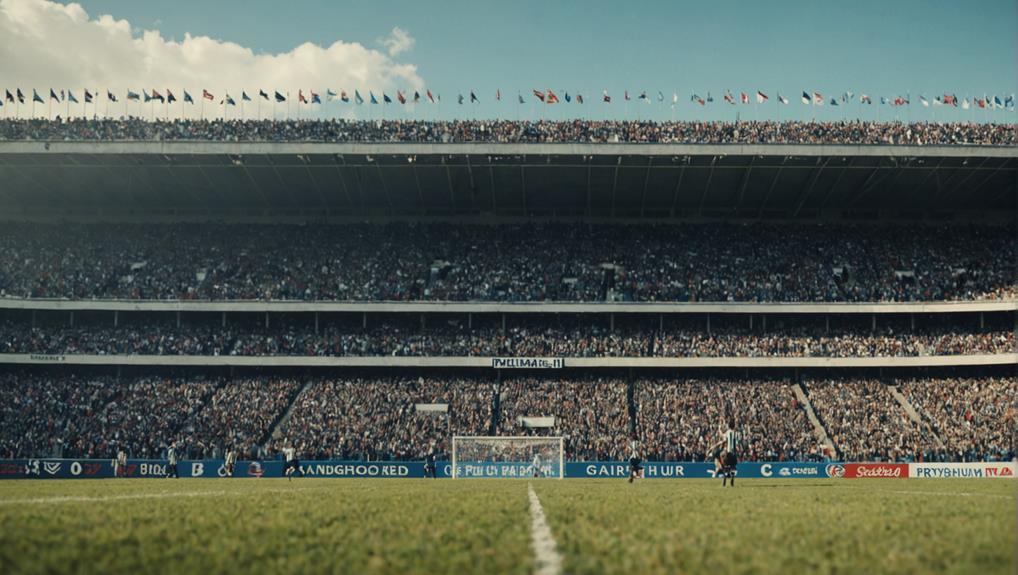
Exploring Football in Uruguay: History and Key Players
July 4, 2024Explore Uruguay's football saga with a vibrant history rich in talent. Legends like Diego Forlán and Luis Suárez illuminate the field. Discover how key influencers shaped the game's identity, impacting generations of fans. Uncover the dazzling triumph in the iconic Maracanazo match against Brazil, encapsulating the spirit of Uruguayan football. Delve deeper to unearth the World Cup victories that solidified Uruguay's fame on the global stage. Feel the passion of the fans, the clash of Primera Division clubs, and the pulse of the stadiums. Experience the essence of Uruguayan football and be swept away by its enthralling narrative.
Uruguay's Footballing Beginnings
Uruguay's footballing journey kicked off with the arrival of British immigrants in the 19th century, introducing the sport to the local community. In 1881, the first recorded football match in Uruguay featured Montevideo Rowing Club against Montevideo Cricket Club. Albion F.C., founded in 1891, became the first established football club in Uruguay. Additionally, CURCC, originating in the same year, would later transform into Club Atlético Peñarol.
The influence of British football club tours in South America played a pivotal role in the spread and development of football in Uruguay. These interactions not only shaped the early structure of football clubs in the country but also laid the foundation for Uruguay's future success in the sport.
Through the initiatives of British immigrants and the establishment of clubs like Albion F.C. and CURCC, the passion for football in Uruguay began to flourish, setting the stage for the nation's remarkable footballing history.
Early Successes and Achievements
You'll be fascinated by Uruguay's early football successes. From winning the first FIFA World Cup in 1930 to securing the most Copa América titles in history, Uruguay has a rich footballing history.
Not to mention their legendary victories in the Olympics and the iconic 'Maracanazo' in 1950.
Initial Football Triumphs
During the early 20th century, Uruguay made a significant mark in the world of football with a series of remarkable triumphs and achievements. The Uruguayan national team stood out as one of the first international powerhouses in football, showcasing their talent on the global stage.
Winning the inaugural FIFA World Cup in 1930 by defeating Argentina in the final was a historic moment that solidified Uruguay's place in football history. Prior to this, Uruguay had already clinched Olympic gold in football in both 1924 and 1928, demonstrating their consistency and dominance in the sport.
Key players like Jose Nasazzi, Pedro Cea, and Jose Andrade played pivotal roles in Uruguay's early football successes. Their contributions, along with the team's elegant, speedy, and effective style of play, earned them praise from spectators and opponents alike.
These initial triumphs not only brought glory to Uruguay but also laid the foundation for their future success in football.
Notable Early Victories
Amongst the early successes and achievements in the world of football, stood a notable victory for Uruguay in the 1924 Olympics tournament. Uruguay clinched the title by defeating Switzerland 3-0 in the final, marking their first major international football success.
Key players like Jose Nasazzi, Pedro Cea, and Jose Andrade played pivotal roles in Uruguay's early victories, showcasing their talent and determination on the field. Uruguay's style of play during the 1924 Olympics was widely praised for its grace and effectiveness, enchanting fans and experts alike.
This triumph solidified Uruguay's reputation as a footballing powerhouse, setting the stage for future successes on the international stage. The 1924 Olympics victory was a significant milestone in Uruguay's football history, highlighting their skill, teamwork, and passion for the beautiful game.
Iconic Uruguayan Footballers

Iconic Uruguayan footballers have left a lasting impact on the world of soccer with their exceptional skills and contributions to the sport.
Luis Suárez, Uruguay's all-time leading goal scorer, has made a significant mark in European club football with his goal-scoring prowess.
Héctor Scarone, a legendary Uruguayan player, is remembered for his exceptional skills that greatly benefited the national team.
Enzo Francescoli, a highly regarded midfielder, achieved success both in South America and Europe, showcasing his versatility on the field.
Alcides Ghiggia, famous for his winning goal in the 1950 World Cup final, remains an iconic figure in Uruguayan football history for his significant contribution to that historic victory.
Diego Forlán, a prolific striker, not only excelled in European club football but also represented Uruguay with distinction, solidifying his place among the country's footballing legends.
These footballers haven't only brought glory to Uruguay but have also inspired generations of players with their talent and dedication to the beautiful game.
Maracanazo: A Legendary Victory
Uruguay's historic victory over Brazil in the 1950 FIFA World Cup final at the Maracana stadium, famously known as Maracanazo, stands as a legendary triumph that reverberates through the annals of football history.
This unexpected win marked a pivotal moment in the sport's timeline. Here's why:
- Symbolic Meaning: The term Maracanazo translates to 'the Maracana blow' and encapsulates Uruguay's stunning victory over the host nation Brazil.
- Historic Upset: Uruguay's 2-1 triumph in the final remains one of the most significant upsets in World Cup history, shocking the global football community.
- Winning Goal: Alcides Ghiggia etched his name in football folklore by scoring the decisive goal, securing Uruguay's second World Cup title in a match filled with drama.
- Legacy: The Maracanazo victory solidified Uruguay's football legacy, leaving an indelible mark on the sport's history and continuing to be hailed as a remarkable moment in sports history.
Uruguay's World Cup Triumphs

You may know that Uruguay holds a remarkable World Cup record with victories in 1930 and 1950. These triumphs not only showcased the talent of legendary Uruguayan players but also left a lasting impact on the world of football.
The significance of Uruguay's World Cup successes continues to influence the country's footballing legacy to this day.
World Cup Victories
Uruguay clinched the FIFA World Cup title twice, in 1930 and 1950, cementing their status as formidable contenders in global football. These victories hold a special place in the history of football, showcasing Uruguay's prowess on the biggest stage.
Here's a breakdown of their World Cup triumphs:
- 1930 Victory: Uruguay secured their first World Cup victory in the inaugural tournament held in their home country. The final match saw Uruguay triumph over Argentina, solidifying their dominance in South American football.
- 1950 Triumph: In a historic upset known as the 'Maracanazo', Uruguay stunned the world by defeating Brazil in the final at the Maracanã Stadium. This victory not only showcased their skill but also their resilience in the face of strong opposition.
- Global Recognition: These victories elevated Uruguay's standing in the football world, establishing them as a powerhouse with a rich World Cup history.
- Legacy: The triumphs in 1930 and 1950 remain pivotal moments that continue to define Uruguay's football legacy to this day.
Legendary Uruguayan Players
Several legendary players played pivotal roles in securing Uruguay's World Cup triumphs. Alcides Ghiggia and Juan Alberto Schiaffino were instrumental in leading Uruguay to victory in the 1950 World Cup, famously known as the 'Maracanazo.' Ghiggia's decisive goal in the final against Brazil stunned the world, while Schiaffino's creative playmaking abilities were vital throughout the tournament.
These players epitomized Uruguayan footballing excellence, showcasing skill, determination, and tactical acumen on the world stage.
Uruguay's World Cup successes in 1930 and 1950 solidified their reputation as a football powerhouse. The resilience and style of play displayed by legendary figures like Ghiggia and Schiaffino left a lasting impact on the sport in Uruguay and beyond. Their contributions to the national team's triumphs continue to be celebrated, highlighting their enduring legacy in Uruguayan football history.
Impact on Football
With their FIFA World Cup victories in 1930 and 1950, Uruguay left an indelible mark on the global football landscape. These triumphs not only showcased Uruguay's footballing prowess on the international level but also solidified their reputation as a powerhouse in the world of football.
The 1950 World Cup victory, famously known as the 'Maracanazo,' where Uruguay defeated Brazil in the final at the Maracanã Stadium, is considered one of the greatest upsets in football history.
Here are four key impacts of Uruguay's World Cup triumphs:
- Pioneering Success: Uruguay became the first country to win two World Cups, setting a high standard for national teams worldwide.
- Global Recognition: The victories elevated Uruguay's football teams to iconic status and increased their presence on the international football stage.
- Inspiration to Future Generations: The triumphs continue to inspire young players and football enthusiasts, shaping the country's football history.
- Historical Significance: The 1930 and 1950 World Cup victories remain significant milestones in football history, showcasing Uruguay's dominance and resilience on the grandest football tournament platform.
Copa America Dominance
Demonstrating the Copa America tournament, Uruguay has secured an impressive 15 titles, showcasing their football prowess on the international stage. This remarkable achievement cements Uruguay's dominance in South American football, underlining their legacy as a powerhouse in the sport.
Winning the Copa America multiple times not only demonstrates Uruguay's consistency and competitiveness but also highlights the quality and talent of Uruguayan footballers throughout history. The country's success in the tournament reflects a strong football culture and a deep passion for the sport that resonates within the nation.
Uruguay's Copa America triumphs serve as a confirmation of their enduring football legacy and the lasting impact they've had on the international stage. With a record number of titles under their belt, Uruguay stands as a formidable force in South American football, consistently showcasing their skill and determination on the field.
Their Copa America dominance is a source of pride for the nation and a symbol of their unwavering commitment to excellence in the sport.
Women's Football in Uruguay

Uruguay's women's national football team, established in 1996, represents the country in international competitions. Women's football in Uruguay is gaining momentum, with increased participation and support for the national team.
Here's a snapshot of the current state of women's football in Uruguay:
- Competitions: The team competes in South American championships, facing off against strong rivals like Argentina, Brazil, and Colombia.
- Opponents: In various tournaments, Uruguay's women's team has played against countries such as Peru, Ecuador, and China, showcasing their skills on the international stage.
- Recent Matches: Recent fixtures have seen the national team taking on formidable opponents like Brazil, Colombia, and Venezuela, highlighting their competitive spirit and determination.
- Growth: The sport is steadily growing in Uruguay, with more women participating in football and rallying behind the national team, reflecting a bright future for women's football in the country.
Notable Primera Division Clubs
When it comes to the Primera Division in Uruguay, two clubs stand out – Peñarol and Nacional. These iconic teams have a rich history of success both domestically and internationally, showcasing the country's footballing excellence.
The matches between them, known as the Uruguayan Clásico, are filled with intense rivalries and fervent fan support.
Iconic Uruguayan Football Clubs
Peñarol and Nacional stand out as the most prominent clubs in the Uruguayan Primera División, boasting a rich history of success both domestically and internationally. Here are some key points about these iconic Uruguayan football clubs:
- Peñarol has clinched the league title 51 times, while Nacional follows closely behind with 49 championships.
- Both clubs have excelled in international competitions, solidifying their competitive prowess on a global scale.
- The matches between Peñarol and Nacional, famously known as the Uruguayan Clásico, are intense affairs that captivate fans and highlight the deep-rooted rivalry between the clubs.
- Numerous Uruguayan players from Peñarol and Nacional have left a lasting impact on European club football, elevating the reputation of these traditional Uruguayan powerhouses.
The historical significance of Peñarol and Nacional not only reflects Uruguay's rich immigrant history but also adds a distinctive cultural element to the legacy of these revered football institutions.
Impactful Players' Contributions
The influential players from Nacional and Peñarol have left a lasting mark on both Uruguayan and global football landscapes. These players not only contributed greatly to the success of their respective Uruguayan clubs in the Primera División but also played vital roles in the national team's achievements.
Many of these impactful players from Peñarol and Nacional have successfully moved to European club football, where they continue to shine and showcase their talent on a larger stage.
Their contributions haven't only elevated the reputation of Uruguayan football but have also strengthened the presence of South American football in the global arena. The success of these players in international competitions has further solidified the rich history and passionate football culture in Uruguay, with matches between Peñarol and Nacional standing out as intense and highly anticipated events.
The legacy of these players continues to inspire the next generation of footballers in Uruguay and beyond.
Uruguayan Football Stadiums

In the heart of Uruguay, football enthusiasts can find a variety of iconic stadiums that showcase the rich history and passion for the sport in the country.
Here are some remarkable Uruguayan football stadiums:
- Estadio Centenario: This historic stadium in Montevideo holds a special place as Uruguay's national stadium and was the venue for the first FIFA World Cup final in 1930.
- Estadio Gran Parque Central: Home to Club Nacional de Football, this stadium stands out as one of the oldest in Uruguay, steeped in tradition and glory.
- Estadio Campeón del Siglo: The modern facilities and electric atmosphere at this stadium, the home ground of Club Atlético Peñarol, make it a must-visit for any football fan.
- Estadio Luis Franzini: Located in Montevideo, this stadium serves as the home turf for Defensor Sporting Club, adding to the diverse tapestry of Uruguayan football venues.
These stadiums not only host thrilling matches but also embody the deep-rooted love for football that resonates throughout Uruguay.
References and Further Reading
Explore a range of resources to deepen your understanding of the rich football culture in Uruguay.
The history of football in Uruguay traces back to the late 19th century, influenced by British immigrants who introduced the sport. Albion F.C., established in 1891, set the stage for the development of the Uruguayan Primera División and the vibrant football culture that followed. To investigate the roots of Uruguayan football, researching the impact of British football club tours in South America can provide valuable insights into the sport's evolution in the country.
For a more contemporary view, exploring the histories of Peñarol and Nacional, the dominant clubs in the Uruguayan Primera División, can offer a glimpse into the competitive landscape of Uruguayan football. Particularly, studying the rivalry between Peñarol and Nacional, known as the Uruguayan Clásico, sheds light on the intense competition and passionate fan support that characterize Uruguayan football culture.
Delving into these facets of Uruguayan football can enrich your appreciation for the sport's significance in the country's history and identity.
Conclusion
So there you have it – Uruguay's rich footballing history is filled with legendary players, historic victories, and passionate fans.
Did you know that Uruguay has won the Copa America a record 15 times, more than any other country?
With a strong tradition of success and a deep love for the beautiful game, Uruguay continues to be a force to be reckoned with in international football.
Keep exploring and discovering more about this footballing powerhouse!


